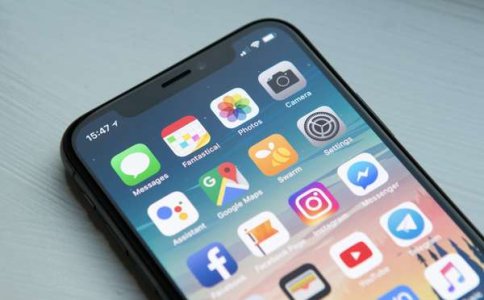Suspicious apps: Cybersecurity firm points out five warning signs to look out for
- Replies 1
Smartphones are incredibly useful, offering us access to information and entertainment at the tip of our fingertips. However, they also come with potential security and privacy risks. That's why it's crucial to be cautious and vigilant about the apps we install on our phones.
A renowned cybersecurity company, McAfee, recently issued a warning to both Android and iPhone users.
They emphasised that anyone could fall prey to a hacked app because malicious programs often disguise themselves as harmless. These deceptive apps may seem helpful at first glance, but they could be hiding malicious intent.
In a memo released last week, McAfee outlined five 'permissions' that could serve as warning signs for suspicious apps. If an app requests access to features it shouldn't need, it might be worth investigating further to determine if it has hidden motives.

'Requests for permissions such as these aren't a sign of an invasive app in and of themselves,' the company stated.
'Some apps require them to work. The telltale sign of an invasive app is when the app asks for permissions it doesn't need. Think like the flashlight app that wants access to your microphone.'
Two important warning signs to be cautious of in an app are when it asks for access to your device's camera or microphone. Although certain legitimate apps like video chat applications require such permissions, you should be wary of other apps that seemingly have no need for these features.
For example, you might come across an app that appears harmless, like a simple game, but it asks for access to your phone's microphone or camera. This is a cause for concern because such permissions could be misused to secretly track your mobile activities or, worse yet, to spy on you through audio and video surveillance.
Another indicator of a potentially malicious app is when it tries to access and modify your contacts. This could result in prank or scam calls or messages being sent to random contacts in your address book, but it may also lead to identity theft and the dissemination of harmful content.
The fourth warning sign is when an app requests permission to track your location, which could compromise your safety and expose your movements.
Finally, the fifth and last warning sign is when the app requests access to your calendar, potentially exposing your schedule and private events, making you vulnerable to exploitation.
McAfee also pointed out that many smartphone users, especially young children downloading new apps, tend to quickly skip through the user agreement and app permission screens without reading them carefully.
However, it's important to be vigilant even if you've already installed an app, as it's never too late to identify invasive ones and remove them.

It's crucial to remind your loved ones to be cautious while using their devices and prioritise privacy in today's digital age. By being aware of the information you unknowingly share with others, you can safeguard your personal and important data.
To ensure your safety when downloading and using apps on your smartphone, stay alert. Take the time to read the app permissions and exercise caution. If anything seems suspicious, don't hesitate to uninstall the app immediately.
Members, if you have other safety tips and advice for navigating your smartphone and downloading new apps, we welcome you to share them with us in the comments below!
A renowned cybersecurity company, McAfee, recently issued a warning to both Android and iPhone users.
They emphasised that anyone could fall prey to a hacked app because malicious programs often disguise themselves as harmless. These deceptive apps may seem helpful at first glance, but they could be hiding malicious intent.
In a memo released last week, McAfee outlined five 'permissions' that could serve as warning signs for suspicious apps. If an app requests access to features it shouldn't need, it might be worth investigating further to determine if it has hidden motives.

Smartphone owners are warned over five dangerous signs that could indicate an app is malicious. Credit: Unsplash/williamtm.
'Requests for permissions such as these aren't a sign of an invasive app in and of themselves,' the company stated.
'Some apps require them to work. The telltale sign of an invasive app is when the app asks for permissions it doesn't need. Think like the flashlight app that wants access to your microphone.'
Two important warning signs to be cautious of in an app are when it asks for access to your device's camera or microphone. Although certain legitimate apps like video chat applications require such permissions, you should be wary of other apps that seemingly have no need for these features.
For example, you might come across an app that appears harmless, like a simple game, but it asks for access to your phone's microphone or camera. This is a cause for concern because such permissions could be misused to secretly track your mobile activities or, worse yet, to spy on you through audio and video surveillance.
Another indicator of a potentially malicious app is when it tries to access and modify your contacts. This could result in prank or scam calls or messages being sent to random contacts in your address book, but it may also lead to identity theft and the dissemination of harmful content.
The fourth warning sign is when an app requests permission to track your location, which could compromise your safety and expose your movements.
Finally, the fifth and last warning sign is when the app requests access to your calendar, potentially exposing your schedule and private events, making you vulnerable to exploitation.
McAfee also pointed out that many smartphone users, especially young children downloading new apps, tend to quickly skip through the user agreement and app permission screens without reading them carefully.
However, it's important to be vigilant even if you've already installed an app, as it's never too late to identify invasive ones and remove them.
Key Takeaways
- Cybersecurity firm McAfee has issued a warning regarding malicious apps that prompt users for unnecessary permissions.
- Malicious apps often request five common 'permissions', including gaining access to the device's camera, microphone, location tracking, accessing and modifying contacts, and reading the user's calendar.
- The firm warned that granting access to these permissions can lead to several security issues like identity theft, harmful content spreading or invasions of privacy.
- McAfee stressed the importance of reading app permissions carefully to avoid potential security breaches and recommended the removal of any 'invasive' apps.
It's crucial to remind your loved ones to be cautious while using their devices and prioritise privacy in today's digital age. By being aware of the information you unknowingly share with others, you can safeguard your personal and important data.
To ensure your safety when downloading and using apps on your smartphone, stay alert. Take the time to read the app permissions and exercise caution. If anything seems suspicious, don't hesitate to uninstall the app immediately.
Members, if you have other safety tips and advice for navigating your smartphone and downloading new apps, we welcome you to share them with us in the comments below!







